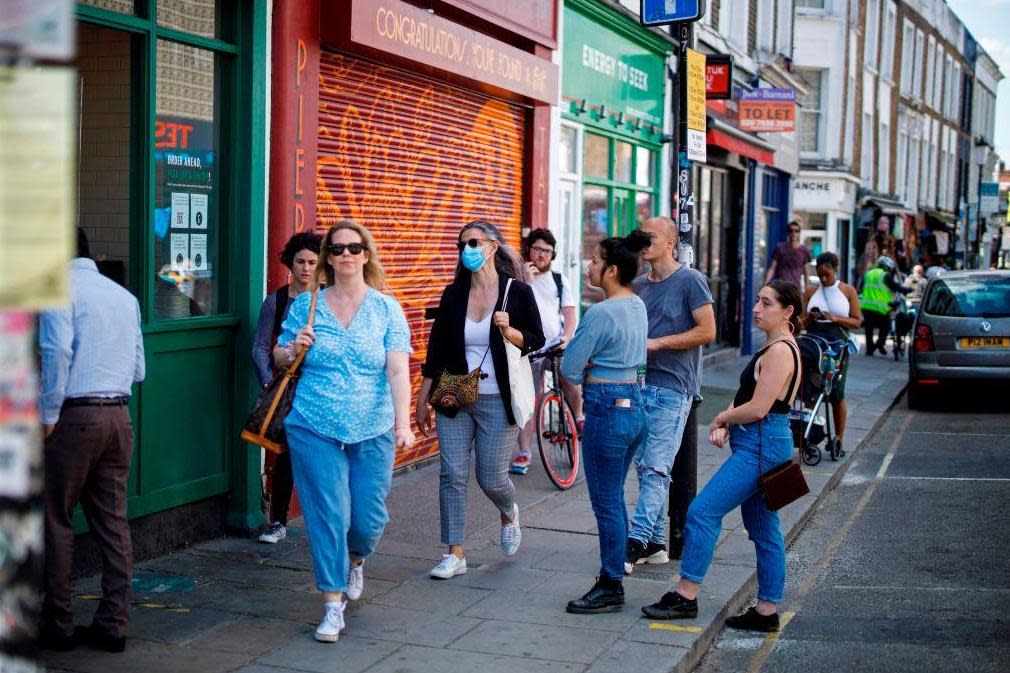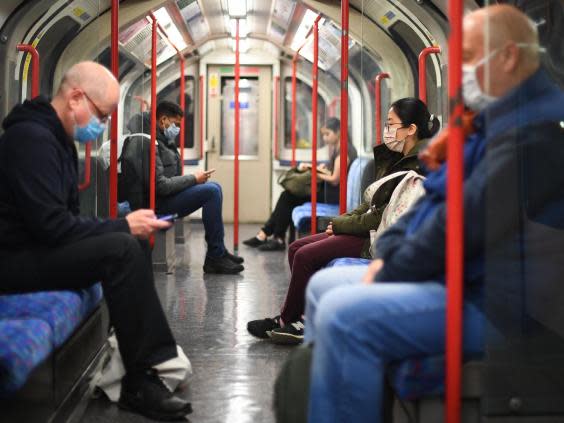Coronavirus: Government face mask advice ‘too little too late’

Doctors, unions and opposition politicians have questioned why it has taken more than two months for the government to make face coverings compulsory on public transport and called for the policy to be extended to all places where social distancing is not possible.
Transport secretary Grant Shapps on Thursday announced that face coverings must be worn in England on buses, trams, trains, coaches, aircraft and ferries from 15 June – more than 10 weeks after the pandemic took hold in the UK.
The British Medical Association (BMA) in April recommended that people should wear face coverings where it is difficult to keep two metres apart.
The BMA is now calling on ministers to extend the policy beyond transport, adding that the risk from Covid-19 would be “much less” if the measures were introduced immediately rather than later in the month.
Speaking after the government on Thursday, BMA council chair Dr Chaand Nagpaul said: “These important measures should not be restricted to public transport but to all areas where social distancing is not always possible – the risk will be much less if the public adopts this now – not mid-June.”
Dr Nagpaul also said the government should ensure the public are supplied with face coverings, as well as providing advice on how to wear them correctly.
London Mayor Sadiq Khan said he had been lobbying the government to introduce mandatory face coverings for “two months”, adding he didn’t implement the measures in London for fear of confusing the government’s national message.
“My concern, and I would go so far as to say my anger, is the delay it has taken because this could mean more people having caught the virus in the community because there are some times when you simply can’t keep your social distance and this delay appears to be good for nobody,” Khan told BBC Breakfast on Thursday.
Khan also said the government was “wrong” not to make face coverings compulsory in the wider public and called for their use in crowded spaces such as shops.

“Why not err on the side of caution? Why not also make it mandatory, particularly in those confined spaces where you may inadvertently pass the virus on, where you may inadvertently catch it because someone else is pre-symptomatic and asymptomatic,” he said.
As of Friday morning, the UK had reported more than 280,000 coronavirus cases and recorded over 39,000 fatalities – the second highest death toll in the world, only behind the US.
Unions had been pushing for compulsory face coverings after dozens of transport workers died after contracting Covid-19. Mick Whelan, general secretary of the train drivers’ union Aslef, said it was a “sensible step”.
Mr Shapps said the new measure comes as passenger numbers are expected to increase when lockdown measures are eased further.
However, Mick Cash, of the Rail, Maritime and Transport union, said the new rules were “long overdue”.
“We fear this announcement is being driven not by safety concerns but by the premature easing of the lockdown which is swelling passenger numbers and making social distancing on transport increasingly impossible,” he said.
Shadow transport secretary Jim McMahon said it was “another example of the government being slow to act”.
Under the new rules, passengers will not be allowed to travel without face coverings, and if they do not wear one they could be fined. There are exemptions for the disabled, young children and those with breathing difficulties.
People in Scotland and Northern Ireland are currently recommended to wear coverings in places where social distancing is more difficult. The Welsh government says it is a matter of personal choice.
From 15 June in England, secondary schools and colleges will open to some students, while shops can reopen if they put social distancing rules in place.
The evidence surrounding the effectiveness of face coverings remains heavily contested, with the World Health Organistion (WHO) consistently saying that there is little benefit to wearing one in public.
Current WHO advice states that only two groups of people should wear protective masks: those who are sick and showing symptoms, or those caring for people suspected to have virus.
The WHO does not usually recommend them for the public because they can be contaminated by other people’s coughs and sneezes or when putting them on or off, or they might offer a false sense of security.
Some health officials that this false sense of security coudl mean that people are less stringent with other preventative measures such as social distancing and hand hygiene.
But that, however, doesn’t mean they have no benefit at all for the general public – it is just that the scientific evidence is weak.
Speaking on BBC Radio 4’s Today programme on Thursday, Professor Anthony Costello of UCL’s Institute for Global Health said “there is no perfect evidence” on the use of face masks.
However, two recent reviews published in the Royal Society and the Lancet journal showed that face coverings can help reduce viral transmission on public transport, Prof Costello added.
“This week there’s been another review in The Lancet journal from Canada and they concluded, from imperfect evidence, but a very large review, face mask use reduces the risk of infection by about 14 per cent,” he added.
Additional reporting by Press Association

